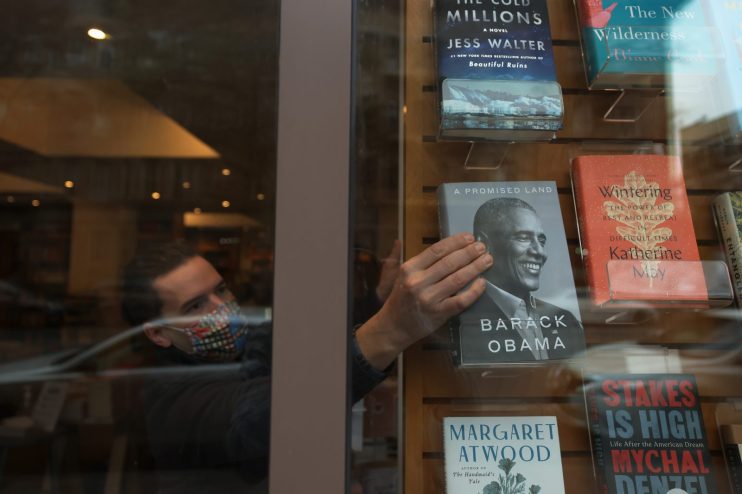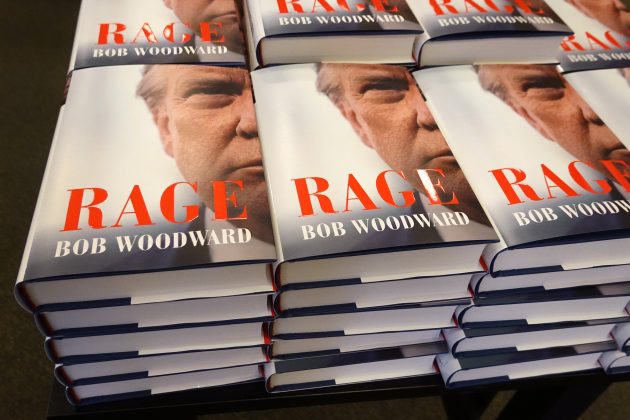Screenshot: How books became the new media battleground

A weekly column from City A.M. bringing you all the biggest stories and trends in technology, media and telecoms
This week
**Media Moment of the Week: French radio kills the Queen
**Publish and be damned: How books became the new media battleground
**Could Pearson become the Netflix of education?
Media Moment of the Week
If you think you’ve had a bad week, spare a thought for Radio France Internationale, which was forced to apologise after it mistakenly published obituaries of around 100 very-much-alive people, including the Queen.

The fatal error, which RFI blamed on a “technical problem”, also announced the premature demise of Clint Eastwood, Pele and Brigit Bardot, as well as Iranian supreme leader Ayatollah Ali Khamanei and former United manager Sir Alex Ferguson.
Spare a thought in particular, though, for 77-year-old French businessman Bernie Tapie. This was at least the third time a news outlet has wrongly reported his death.
How books became the new media battleground
For rival media titans, there’s a new battlefield in town. No, it’s not podcasts or Tiktok or anything like that. It’s books.
As legacy media organisations drag themselves through the tech revolution, vying for pole position in the book industry seems somewhat anachronistic. And yet this is exactly what is happening with Simon & Schuster, one of the US’ so-called Big Five publishers.
Current owner Viacom CBS put the publisher up for sale in March, and is now fielding rival bids in excess of $1.7bn from Rupert Murdoch’s News Corp and German media behemoth Bertelsmann. Vivendi, the French media conglomerate controlled by billionaire Vincent Bollore, is also said to be considering an offer.

It comes at a key time for the publishing industry, which has been buoyed by renewed interest in reading during coronavirus lockdowns, as well as booming demand for anti-racist literature in the wake of the Black Lives Matter movement. Bloomsbury, the British publisher best known for the Harry Potter series, last month reported its highest first-half profits in 12 years.
But this is not a new trend. For years the publishing industry has undergone a wave of consolidation – most notably the formation of Penguin Random House in 2013 following a mammoth merger between Bertelsmann and UK media group Pearson.
Publishing remains a lucrative business, with Penguin Random House pulling in revenue of more than $4bn last year. Rival Harper Collins posted sales of roughly $1.7bn. But aggressive cost-cutting by Amazon, which dominates the market, has whittled down margins to wafer-thin levels, and now it’s a battle for scale.
No wonder, then, that Simon & Schuster is such an attractive target. The suitors are all looking to expand on their existing presence in the market. News Corp already owns Harper Collins, Bertelsmann controls the world’s largest publisher in Penguin Random House, while Vivendi is also battling for control of Lagardere, which owns French publisher Hachette.
Antitrust issues abound, especially for Bertelsmann (as News Corp chief Robert Thomson was keen to emphasise on a call with investors this week). But whatever the outcome, the winner of this hotly-contested auction is likely to emerge as the new behemoth of the book world.
Could Pearson become the Netflix of education?
I’ve written at length before about Pearson and what a torrid time it’s had over recent years (see here), but things might just be turning around. When the publishing giant appointed former Disney bigwig Andy Bird as its new chief executive, you knew they were taking their digital transformation plans seriously.
Even so, news this week that Pearson is setting up a new direct-to-consumer division provides a fascinating insight into the new boss’ plans. With once-trusty textbook sales waning and remote learning on the rise, Bird is now looking to deliver online services directly to customers, rather than just selling to large institutions.
It’s a strategy that’s worked so well for Netflix — and more recently for Disney — and now Bird is hoping to harness it for the education world. He’s even hired former Warner Bros executive Lynne Frank to help lead the unit.
There’s been no detail so far on what exactly this new set-up will look like, though a Netflix-style tiered subscription model could well be on the cards. But either way, Bird appears to have done his homework, and investors and media watchers alike will have a keen eye on Pearson’s future.
The algorithm recommends
- Buzzfeed is buying HuffPost from Verizon Media in a complex stock deal (h/t to the Wall Street Journal for a great scoop). It’s the latest example of media consolidation as online publishers look to build scale, but it’s been met with some bemusement — especially as Buzzfeed closed its UK news operations just six months ago…
- Apple has slashed its App Store commission following a backlash from developers. But is it just a ploy to stave off regulation?
- I spoke to Shabs Jobapuntra, the boss of the record label signing hits ranging from driller rapper Headie One to infuriatingly catchy kids’ song Baby Shark. Seriously.
Got a story? Drop me a line at james.warrington@cityam.com or on Twitter